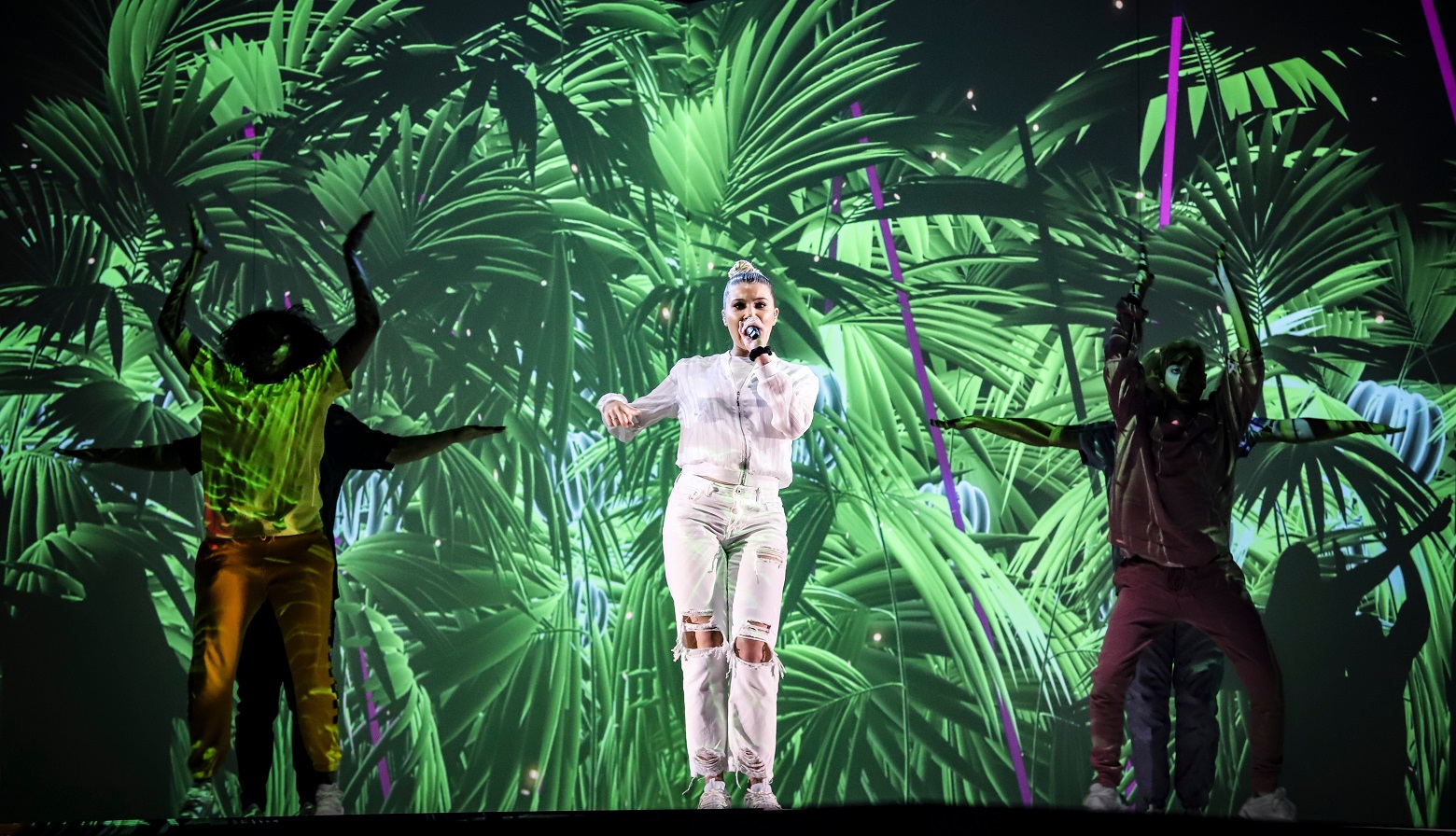
The view from Tel Aviv: The sum and the parts

The view from Tel Aviv: The sum and the parts
One of the fun things about Eurovision in my home country is that I find myself chatting quite a bit with all the non-Eurovision fans that work at the venue who don’t know much about Eurovision but can’t help but getting swept up in the excitement of it all. So they want to know things, and being me, I talk. A lot.
When I was leaving the arena yesterday I ran into one of the security guards who was really curious to know what my badge actually was and what were we doing inside here all day. He got even more animated the more he realized how many things go into what he sees on screen. And then he asked me a very good question about the way I blog: “How do you tell if someone had a good rehearsal?”
It’s something I find myself talking about a lot, because it really encompasses so many things. There’s the initial placing of expectations in context, and that’s always about the song and on a very basic level – what’s the song’s range? What do we think is a realistic maximum result of a song assuming it has a great presentation? A so-so presentation of a great song should do better than a stunning presentation of a weak song.
And then we have all the elements that make a presentation. The performer – not just the vocals, but their ability to transmit to us, viewers, what their song is about. There is the overall sound of the entry and the other people on (or off) stage, There’s the camera work, the colors and the backdrops, and let’s not forget the props! The gimmicks! The fire and the dry ice!
Potential result aside, the main question for me is always: Is that song doing everything it possibly can do? I’d even go as far as saying this is what means the most to me; there are 41 songs, not all of them can win and it’s not just about the competition for me, it’s about the songs and at least knowing they got their fair chance of being properly featured. At the end of the day, some things will work for more people and some for fewer, but as long as it was all done right, and the result is a great performance where the sum is bigger than the parts, there’s not much else I can ask for.
And then: If there are things I think could make it better, would those changes impact its chances to do as best as it could? I’d still want everyone to do their best, but I can’t completely ignore the competition aspect and the predictions, so whether songs have done enough is also an important question. Not to mention that we’re human beings and it’s hard to separate what in our reaction comes from whatever expectation we had of it.
With that in mind, let’s look at the rehearsals of the second semi-final. And one thing is absolutely clear: this is a bloodbath in the making.
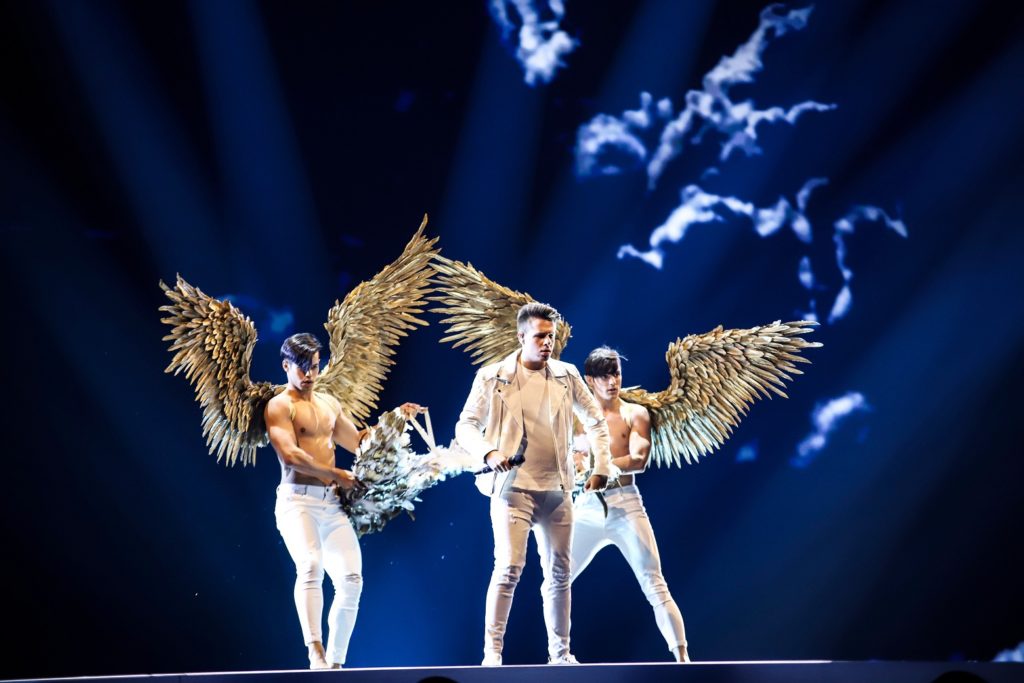
Because taste is subjective, not everyone will agree with this next paragraph, but as I said: songs first. And some songs stand very little chance to do anything, no matter what. In that corner we can find Croatia, which has done a lot to at least look impressive but is also pushing the kitsch into that gray zone of too much to be taken seriously, too little to work for how outlandish it is. Moldova is generic-ballad galore, which isn’t always necessarily an automatic non-qualification, but you really need to have zero competition in that field for that to work. Add to it a gimmick-based performance that does nothing to convey what the song is about and also hides the biggest asset of the song, Anna herself with her presence and feminine self-assurance. And then there’s Lithuania – a song I forgot to blog about earlier today, forgot to rank when I tried to figure out what to make of the damn semi and almost forgot to mention when I was writing this paragraph. I suppose that it is appropriate to have an entirely unmemorable staging for an entirely unmemorable song, but out of everyone, Lithuania is the delegation that is the furthest away from doing everything they possibly can.
Next up are the songs that did pretty much what they are supposed to do, no more and no less. It’s not necessarily groundbreaking, but it’s not terrible or wrong for the song. For that group, context matters, because it being enough really depends on what you’re aiming for and what your competition is in that field.
For example, Ireland did something that worked nicely for the song – but as the song itself never really has a peak or standout moments it’s hard to do much to correct that, even though they did manage to at least create one particularly memorable visual moment. Yet, especially that early in the running order in that semi-final, the sum of the parts doesn’t feel like enough.
On that side of the equation we also have Latvia, who did a wonderfully intimate performance that does bring a lot of warmth and charm to screen and is very right for the song, but with such understated song it’s very hard to draw the attention of viewers.
Then we have songs that have a better chance of doing things in this semi and that came with a concept they already had before. That’s always tricky in its own way because we’re familiar with it, so it feels more relevant to the song, but we’ve also seen it in a different context and on a different stage. Denmark is one like that, and while I actually liked the national final performance better, at least between the two it doesn’t make a difference. The concept is cute enough for the song, but my struggle with both versions is that I’m not sure Leonora’s personality is suited for a routine that is so overly cutesy. For me, the best performances come when they are planned to suit the performer’s strengths and weaknesses, and I do feel this one forces her into being something that isn’t entirely her. Visually it’s pleasant enough, though, and it does have a corner carved out for it, but I don’t think the song is strong enough that a better presentation would have pushed it much beyond the range of its target audience.
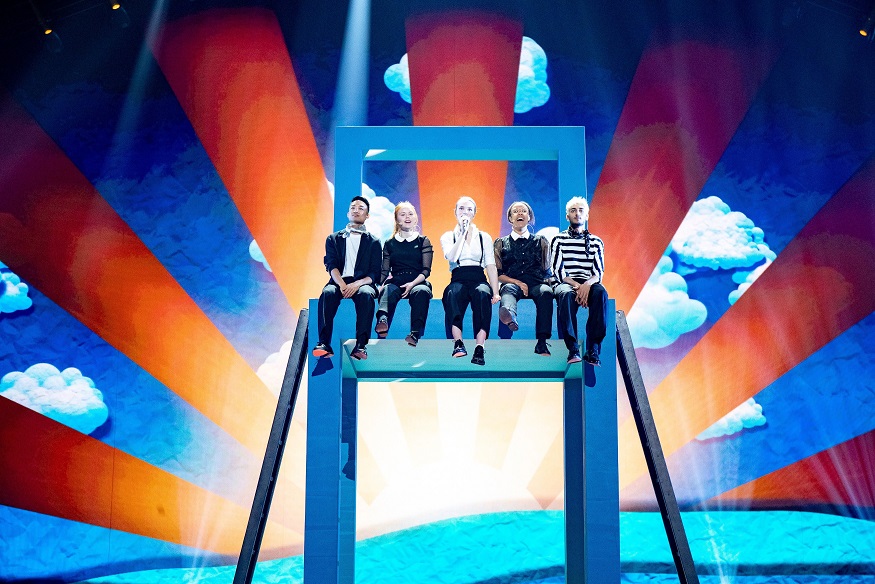
I was a bit confused by some of the press reaction to Sweden, as not only it was a similar affair to the Melodifestivalen performance, it wasn’t exactly outstanding there either. It does, however, do the right things: it uses John’s strengths – his vocals, the positive energy and the likability – it uses a smart and simple staging with his backing singers to highlight the gospel element of the entry and distract from how outdated it is, and visually, of course, it’s the usual slick Swedish performance that looks clean and appealing on screen, with a warm color scheme which complements John’s personality. It’s not a wowing performance, though, just a very solid and safe one as it has enough to aim at both the juries and at least a good portion of the televoters.
Right next to the already-familiar entries, we have the category of the ones we didn’t see before but that did more or less what we expected. It didn’t require much knowledge to figure out that even with a more subdued song, Russia won’t ever arrive at a Eurovision without a considerable amount of props and an elaborate staging, and this one was no different, even if we’ve got so used to their excessive use of gimmicks that the more sparse usage of them almost felt underwhelming. While they still have things that don’t quite work – mostly some angles and a few shots that are too long which breaks the flow of the performance – they are also Russia, after all, and I trust that if I could see these issues they also noticed them when reviewing the performance and will address them accordingly.
Romania adapted their videoclip to the screen. While we didn’t know for sure that this would be their direction for the performance, the choices of elements there seemed like such a deviation from the national final performance that I always felt it was a deliberate part of a concept they had in mind. It works reasonably well, except I’m not entirely sure how connected it feels to the song and whether maybe that fact,, in addition to the staging just being a little weird and spooky, will get in the way.
If Romania had its own character, Switzerland is exactly the opposite. The performance is good and the staging is very effective, cool and modern, but it’s also very generic and clinical. Take the track out and put a different uptempo song on it? It would make no difference. More than that, take Luca out and put a different singer in? It would make no difference either. It doesn’t have much identity and Luca doesn’t really get the chance to display his personality. That’s exactly what has worked several times for Sweden, though, and this entry looks exactly like a Swedish entry that finishes seventh.

We’re now heading over to the underachievers. The ones who really could do better but have chosen not to.
The Armenian delegation said in their press conference yesterday that the staging is very much inspired by the video. It’s true to a certain point – with the coloring and overall atmosphere – but they lost some of the elements that worked really well in the video, like the dancing, and it mostly relies on the fact she is a wonderful vocalist. Which, fortunately, she is. The song is interesting but feels more like a jury song rather than something that can musically appeal to viewers right away, and making it so bleak and so empty doesn’t really help noticing it. More than that, it really doesn’t do enough to show off the different parts of that song. There are so many changes and transitions in the music, but anything that happens on stage at that time is very minor and so much of the song gets lost.
Albania might have never been as high up in my expectations as Armenia, but they have an interesting song that’s pretty much in a field of its own this year, and an impressive performer with a very commanding presence. While I gather that the idea of the staging is showing Jonida off, the entire package is just so uninspired – staging modulation change aside – that the song sounds exactly like the soundtrack music I always found it to be. Something that is nice to hear in the background while doing other things, but there is nothing on the screen – her face included – that captures attention in any way. The color scheme is drab and rarely ever changes, the camera work is as basic as it gets, and because she just stands alone in front of a mic stand, there’s no movement to work with either. It ends up being very long three minutes for something that could have been a lot more noticeable if the staging made any attempt to convey either the atmosphere of the song or what it’s about.
Norway is one of those countries that arrived to Eurovision with a half-baked idea. It almost feels like they were just doing a checklist of all kind of things they wanted in their performance and then they just gave them to the production in a random order (we love random order lists at Eurovision). It almost looks like one of those X Factor performances – they walk around and sing while looking into different cameras while there are pretty things happening on the screen and on stage, but it doesn’t really connect to one another and feel like it’s all a part of the same performance.
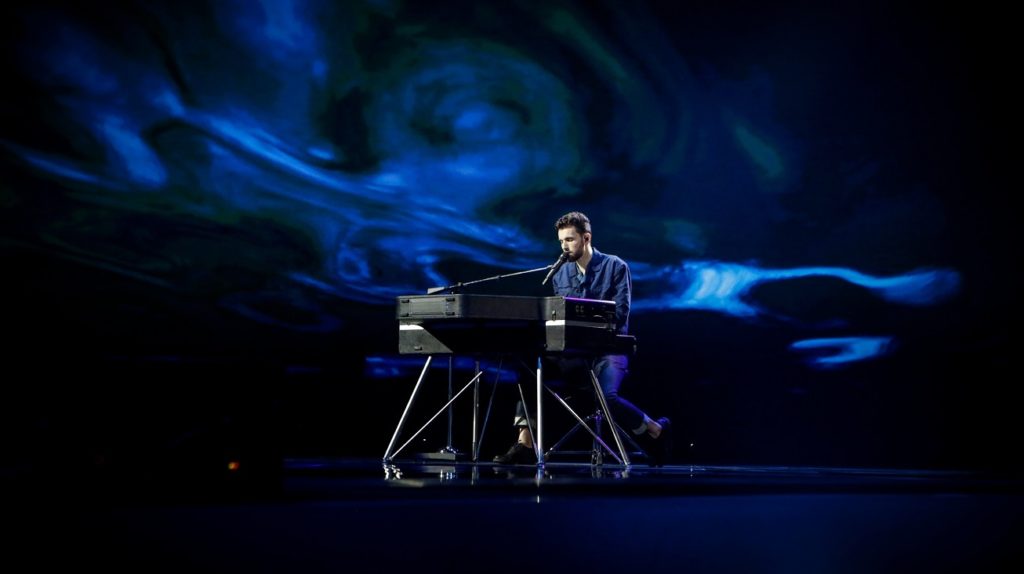
And of course, we have the Netherlands, who apparently forgot to pay their electricity bill, making poor Duncan sit in the darkness. I keep talking to people about this one and what they were thinking and I keep hearing that very familiar “it’s a first rehearsal” line. I’m very well aware it is a first rehearsal, but even within this context, I do find being in that state on your first run a bit worrying. It does have a pretty stage, and I can understand the general idea of trying to make Duncan look a bit lost in that world of his. But when the people in charge of directing that song, a very emotional and moody contender, opt to go for the combination of not showing the singer for almost a third of the song right at the opening, then filling the rest of the song with a variety of very long shots with very very few changes in the backdrop and lightning, and only randomly getting a glimpse of Duncan here and there, I currently have a problem trusting their judgment or their ability to fix this. At least turn on the lights first!
Last, but not least, we have the group that exceeded expectations. This one varies the most in terms of their staging successes translating to actual score board success, but hard work should be rewarded.
Like I wrote yesterday, Austria is the perfect example of getting everything out of your entry. There’s nothing more I can think of I would have asked them to do, or wanted them to do. When I was discussing it with a friend yesterday, we found ourselves talking about details like adding some slight fade effects on some shots – and if you are in shape for that kind of a minor detail to be the only thing that comes to mind, you’re doing well. If we’re talking about getting all the elements right, this one does it. But of course the song in this case was always a harder sell. It has its lovers but it has enough people who hear it and don’t really get it. The performance definitely helps massively in being able to get into it and pay attention to it, but it’s a type of song that the breadth of its appeal is extremely difficult to call.
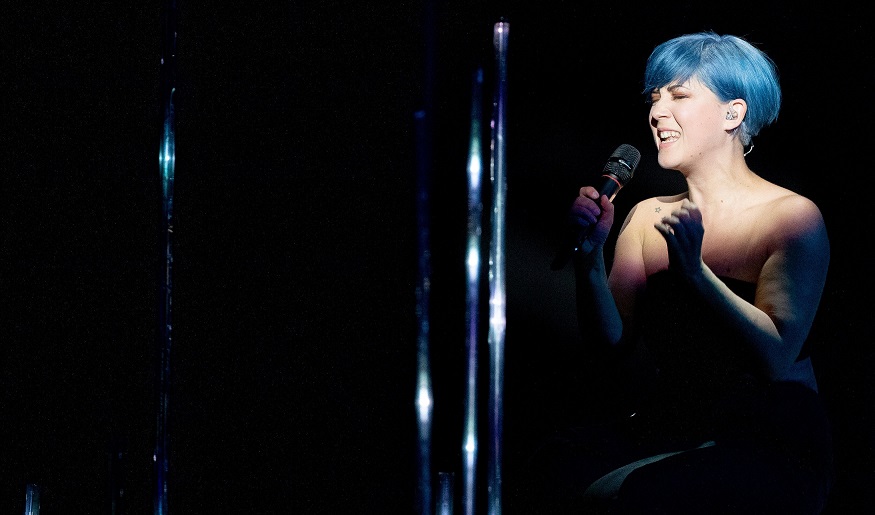
Malta managing to do a complex and busy presentation without overdoing it is still a shock to me. I was also really appreciative of how much they tried to make sure this works for Michela and her age and character. She’s a bit on the awkward side, and going for something humorous and joyful allows her to enjoy herself and be a teenager instead of trying to become whatever is that they think a current pop star looks like. The staging doesn’t only work for that song, it also so unique for it it could never work for anything else, and as such it really stands out in the line up.
North Macedonia’s starting point was slightly easier than the rest: just don’t mess it up. They didn’t. The only real misstep in this is a usage of an unnecessary gimmick but it never really distracts from the song and also disappears early enough that the viewer has enough time to absorb everything else. Tamara is a director’s dream and the camera loves every second it spends on her face, and they have structured the performance in a way in which it progresses and tells a story, with the viewers hitting the emotional peak at exactly the right time to have the impact of the entry stay with them.
And there’s Azerbaijan. I probably wouldn’t go as far as calling it a winner and sending you to place a bet on it, but the press centre reaction wasn’t just because we needed a new favorite after being disappointed by the Netherlands a few minutes earlier. It was because for once Azerbaijan managed to both go big and be entirely bonkers, but also just make it work. The robots setting up Iron Man’s heart or whatever it is they are doing at the beginning could easily be an overkill right from the get-go, but instead they just make sure to set the atmosphere to how they want you to hear the song – electric, mysterious and current. The ethnic touches Chingiz added to the song achieve two important things: they add a different sound to the track, making this essentially western pop track both look and sound different, and they also give him the opportunity to show off his personality and his emotions in a way the rest of the song can’t. His bit of ethnic singing is a sending chills down your spine sort of moment, and the staging capitalizes on that by using the biggest trick at the height of that segment. I’m all for learning lessons, and apparently their lesson from last year was that if they continue using those mainstream modern pop songs, playing it safe makes it too easy to pass it over. Why fit in when you can stand out?
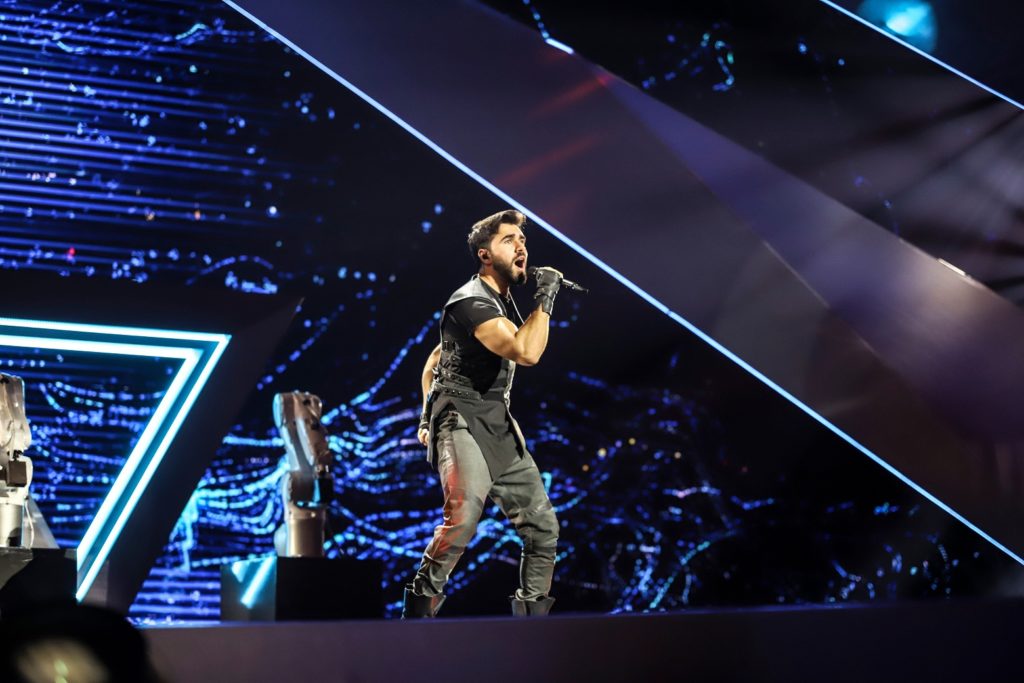
I will return on Thursday, with whatever insights the second round of rehearsals will bring along. Stay tuned!
All images from eurovision.tv
Visit our Eurovision Chat!
0 Comments
Visit our Eurovision Chat!
Follow us:
Shkodra Elektronike from Albania are the winners of ChatVote 2025!
The 21st annual edition of ChatVote is over, and the best song in the forthcoming Eurovision Song Contest is the entry from… Albania!
SongHunt 2025: Detailed results
Time to reveal the full results of SongHunt 2025, including the top ranks of the semi-finals and the split results of the final!
ChatVote 2025 is launched – the voting lines are open!
It’s time for the 21st edition of our legendary annual event. For our chat regulars, the lines are now open for you to submit your votes!
“This Dream Of Mine” by Arwin is the winner of SongHunt 2025!
Our chat community and the public have decided: “This Dream Of Mine” by Arwin from Sweden is the most ROBBED song of the 2025 Eurovision national final season!
ESC 2025: Semi-final running orders revealed!
Who’ll be singing where in which semi-final? It’s the big question – and the official Eurovision YouTube account revealed all this evening!
SongHunt 2025 – Semi-final 3
The SongHunt continues! Semi-final 3 is open and YOUR votes will help to decide who qualifies, so get involved!
SongHunt 2025 – Semi-final 2
The SongHunt continues! Semi-final 2 is open and YOUR votes will help to decide who qualifies, so get involved!
SongHunt 2025 – Semi-final 1
Let the SongHunt begin! Semi-final 1 is open and YOUR votes will help to decide who qualifies, so get involved!
SongHunt 2025 is launched!
It’s time for SongHunt 2025! The public polls and chat events are nearly upon us, and there are some changes you’ll want to know about – so read all about it here and save the dates in your calendars!
Potted Basel: Allocation draw for 2025 takes place
Today saw the allocation draw for the 2025 Eurovision Song Contest to be held in Basel, Switzerland. Here’s how the countries will line up in the two semi-finals!
Shkodra Elektronike from Albania are the winners of ChatVote 2025!
The 21st annual edition of ChatVote is over, and the best song in the forthcoming Eurovision Song Contest is the entry from… Albania!
SongHunt 2025: Detailed results
Time to reveal the full results of SongHunt 2025, including the top ranks of the semi-finals and the split results of the final!
ChatVote 2025 is launched – the voting lines are open!
It’s time for the 21st edition of our legendary annual event. For our chat regulars, the lines are now open for you to submit your votes!
“This Dream Of Mine” by Arwin is the winner of SongHunt 2025!
Our chat community and the public have decided: “This Dream Of Mine” by Arwin from Sweden is the most ROBBED song of the 2025 Eurovision national final season!
escgo! on Twitter

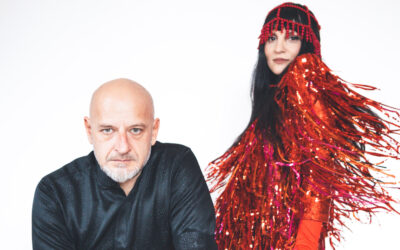




0 Comments